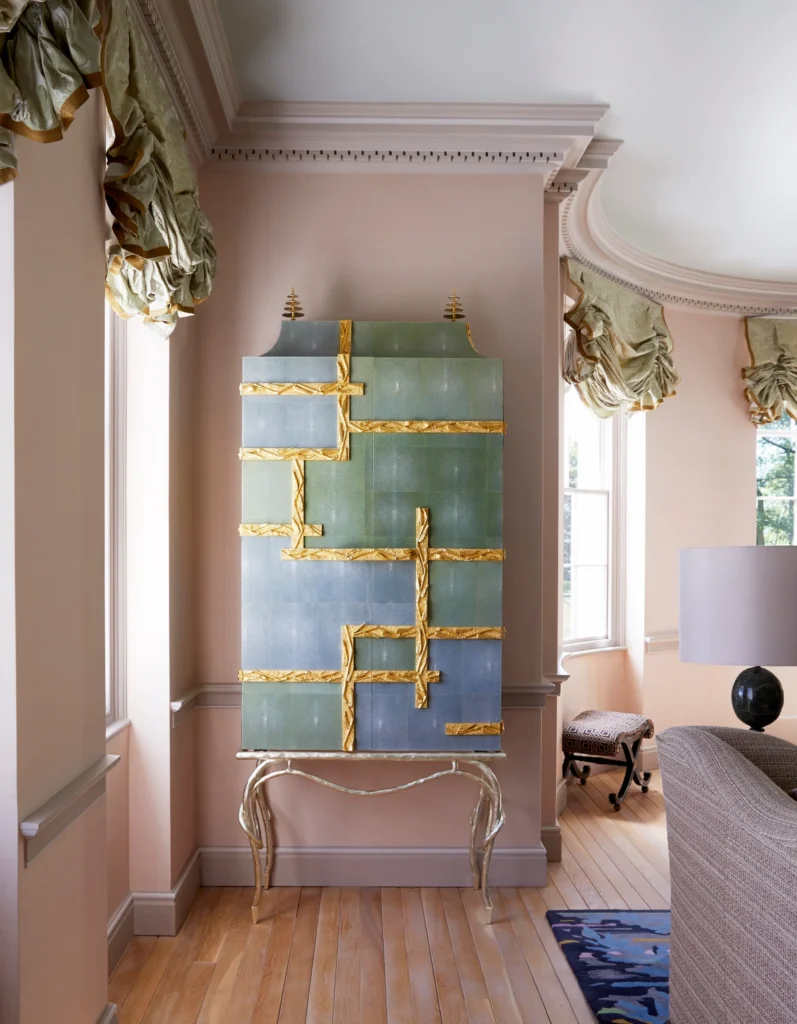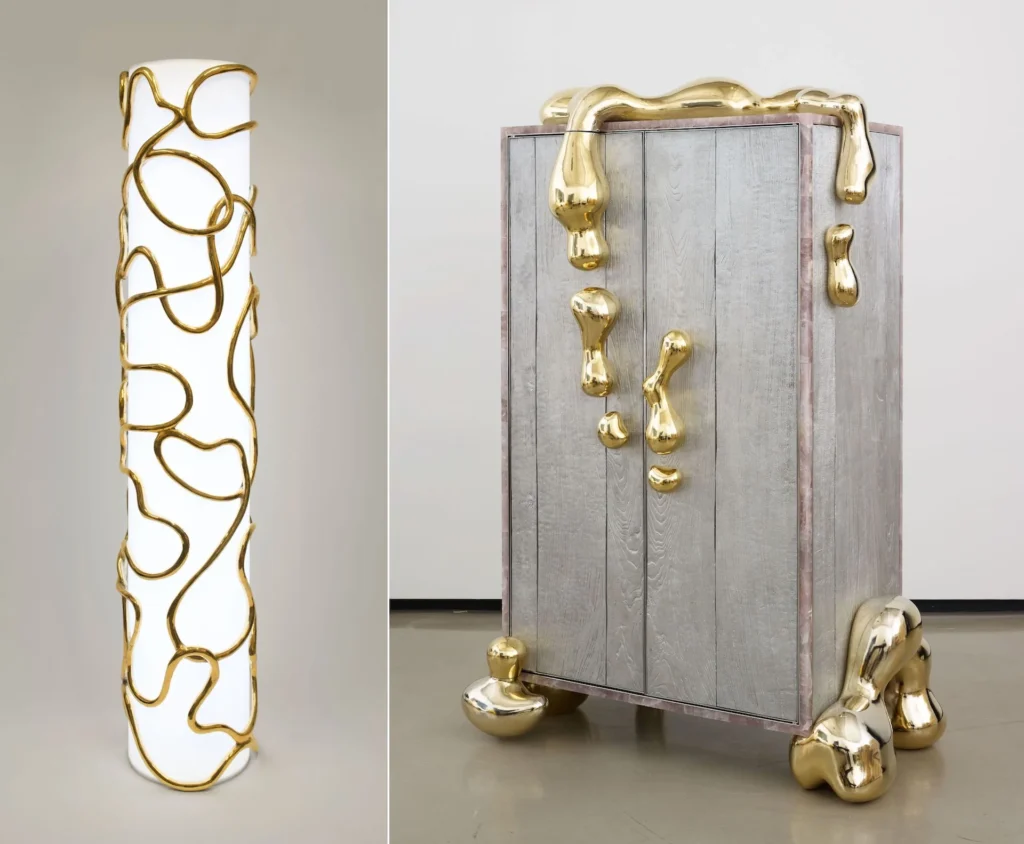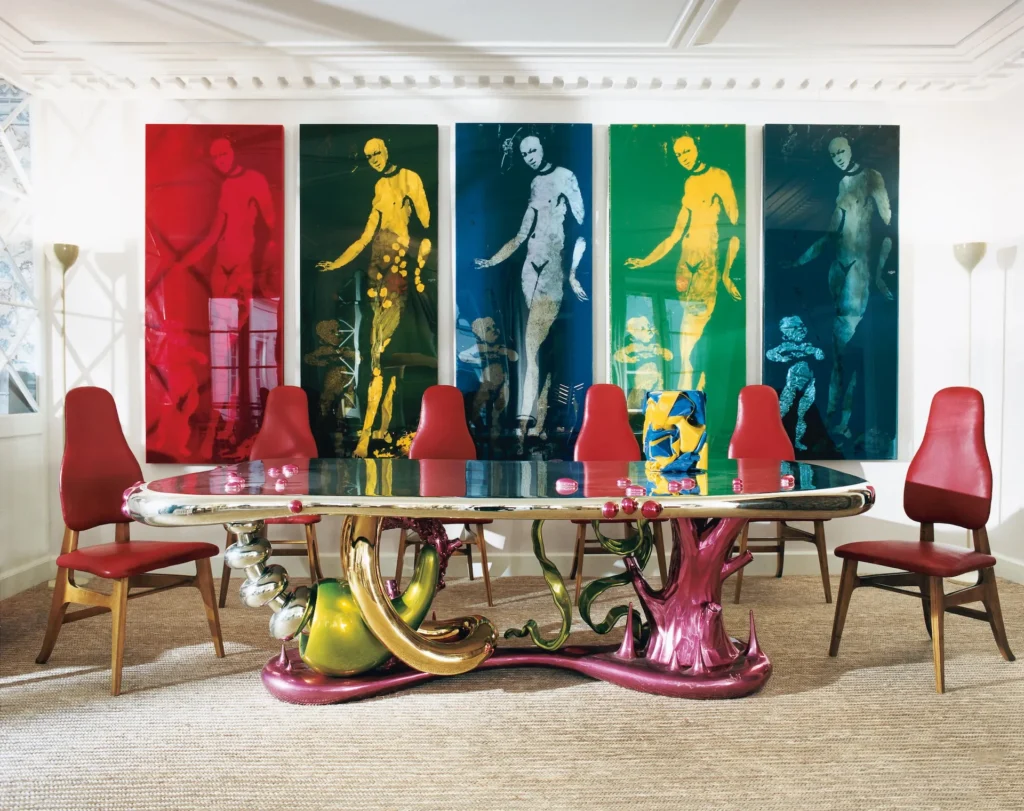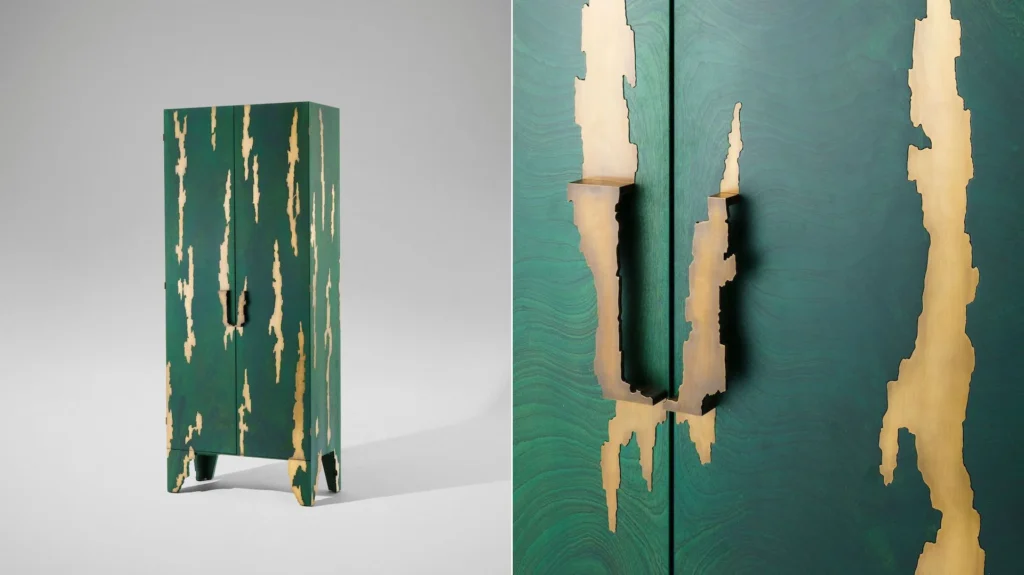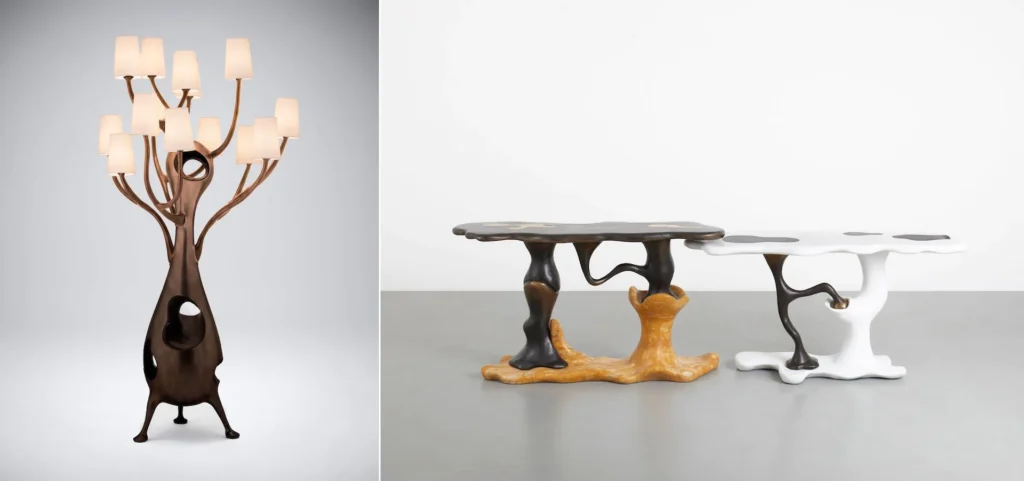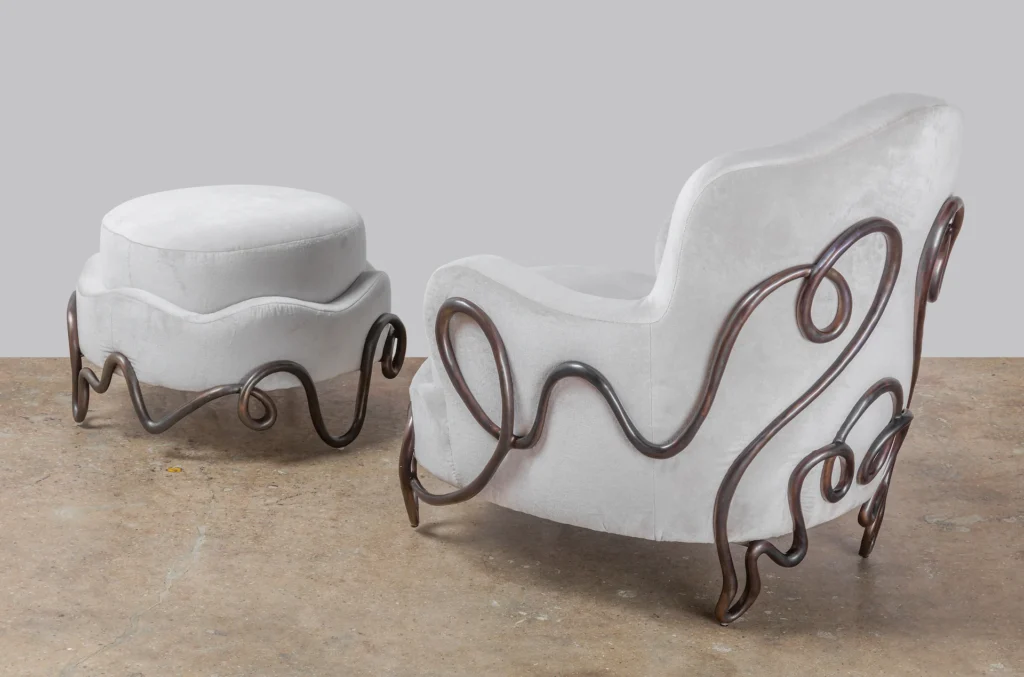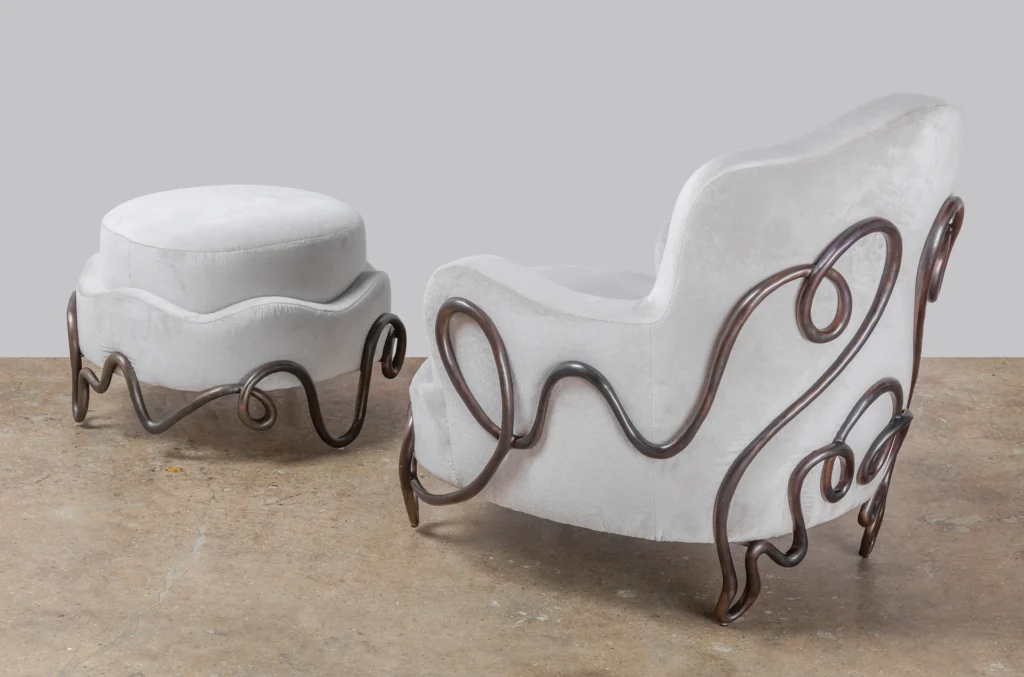
“Mattia is the consummate gentleman. A fun thing happened when I commissioned some furniture for my bedroom. Wendell Castle was making two chairs in gold leaf, and Mattia was going to make a cylindrical side table and cabinet of drawers. When there was some confusion about how the two designers would ensure that their pieces harmonized, Mattia immediately offered the following solution: ‘Wendell is my senior, so please suggest that he can choose his color, and I will make sure mine works well with his.’ Such a generosity of spirit!”
—George Lindemann, collector
It is an open secret in the world of design that Swiss-born, Paris-based designer Mattia Bonetti is the consummate gentleman. Even at the height of success following an astoundingly prolific 40-year-career, Bonetti—my recent Materials and Furniture: The Legends guest—remains gracious, personable, and unpretentious, all while loving the life he lives.
At the beginning of Bonetti’s career in the early 1980s, he was one of only a handful of young artist-designers trailblazing the burgeoning field of art furniture. At the time, furniture was almost exclusively a product of the industrial system, in which limited attention was paid to innovation and craftsmanship. As part of a visionary cadre based mainly in Paris, London, and New York, Bonetti was instrumental in developing the market for artisanally produced collectible design, or “haute couture furniture” as it’s often called. And he is the only one from the original movement still committed to this niche practice.
Represented by two world-class galleries, David Gill in London and Kasmin in New York, Bonetti continuously excels at conceiving experimental, wildly expressive designs of the highest quality, always exploring fresh materials and techniques through his own, unique visual language. His creative energy is seemingly boundless; he never repeats himself even as he generates one novelty after another. No living designer has produced a greater variety of furniture forms than Bonetti.
Bonetti’s grandly idiosyncratic Abyss Dining Table is arguably his most iconic piece, one that fully embodies his artistic vision, undying love for handcraft, and penchant for complex production processes. Celebrating its 20th anniversary this year, this fantastic design, like much of Bonetti’s oeuvre, was inspired by nature—in this case shapes that evoke underwater wonders like deep sea caves and coral formations, which required several skilled artisans to realize, including a plaster modeler, silicon molder, bronze caster, gilders, and a steel bender at an auto body workshop. Only a few editions have been produced, and yet this table has become a highly sought-after staple of major design collections, including those of Reed Krakoff, Jacques Grange, and Francis Sultana.
The complexity of Bonetti’s designs attracts those who place the highest premium on the masterfully handmade. “I have had the pleasure of working with Mattia for over 25 years,” Sultana, one of the most avid Bonetti collectors, told me. “His work always pushes the boundaries of art and design. Each and every creation makes us sit back in awe. He continues to amaze me, not only with his originality but also with his singular vision. There is no one like Mattia.”
Bonetti was born in the Italian-speaking part of Switzerland and grew up in Lugano. His childhood home was filled with an array of decorative arts thanks to his antiques-dealer parents, who encouraged him to choose his own path. Bonetti decided to pursue textile design at the Centro Scolastico per l’Industria Artistica in Lugano. After university, he moved to Paris, where he met French stage designer Élisabeth Garouste, with whom he formed the studio Garouste & Bonetti in 1981. The duo quickly gained an international following and the rest is history.
A tall-backed chair in painted wrought iron and cowhide, the Chaise Barbare was the first piece that Garouste and Bonetti designed together. Its irregular, unconventional silhouette announced the radical values that would define 1980s design culture—ironic, symbolic, eccentric, and historicist—which earned it a place in a number of museum collections around the world. Soon Garouste and Bonetti were commissioned to create some of the most celebrated French interiors of the era, including Château de Boisgeloup, the 18th-century Normandy home of Pablo Picasso, owned by his grandson Bernard Ruiz-Picasso, as well as La Palace, a former theater turned into Paris’ most popular discothèque.
In 1985, Garouste and Bonetti met a man who would change their lives: Pierre Staudenmeyer, cofounder together with his partner Gérard Dalmon of Galerie Néotù in Paris, one of the world’s first galleries dedicated to contemporary art furniture. Garouste & Bonetti became the stars of the gallery’s roster. Néotù closed in 2001, but the objects that the duo produced for Staudenmeyer remain in high demand and fetch astronomical prices on the secondary market.
Another central figure in Garouste & Bonetti’s career was French fashion designer Christian Lacroix, whom they met in 1987. In those years, Lacroix was a cultural sensation whose couture and prêt-à-porter collections—defined by daring colors and patterns as well as intriguing historical references—generated countless global headlines. When he decided to open a new couture house, he commissioned Garouste & Bonetti to create not only the interiors but also the logo, packaging, and graphics, treating the entire project as a holistic gesamtkunstwerk. Riffing on Lacroix’s background in historical costume and his aura of insouciant opulence, the resulting designs were deemed an electrifying triumph by admirers around the world.
In 1988, Garouste & Bonetti began to collaborate with another great patron of their work, London-based gallerist David Gill, known for his keen eye for fresh talent as well as his global reach. As the new millennium approached, the duo gravitated toward a more contemporary, less historicist, idiom and began exploring more poetic aesthetics. The year 1999 was particularly pivotal in developing this new direction as they produced an unforgettable series of designs: the Ring Coffee Table, the St Petersburg Chest of Drawers, and the Seville and Polynesia Lamps. The next year, though, the duo separated. Bonetti established his own studio in Paris’s 11th arrondissement and maintained the relationship with David Gill Gallery.
In the two decades since, Gill and Bonetti have forged an astonishingly fruitful partnership while playing a key role in developing the culture and commerce of limited-edition design. Gill has allowed Bonetti to fully express his imagination and manifest his endless trove of ideas—which has led to some of the most magical furniture designs of the 21st century, existing at the extraordinary intersection of handcraft, technology, and fantasy. Like so many, I can’t wait to see what he does next. This article was published today in Forum Magazine by Design Miami/.
Mattia Bonetti’s forthcoming solo show Florida, featuring a brand new series, will open at David Gill Gallery on June 23rd.
